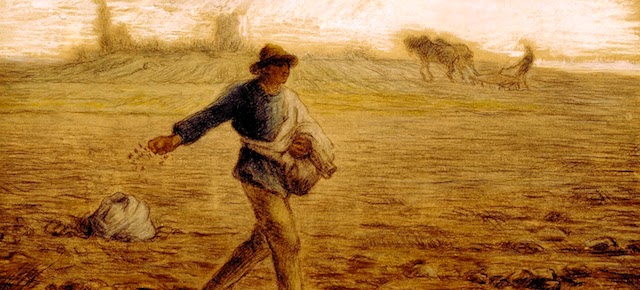
A few days ago, I happened across the round-table discussion with Wendell Berry, Paul Kingsnorth (author of the forthcoming Confessions of a Recovering Environmentalist), and economist Kate Raworth on BBC Radio 4’s Start the Week hosted by Andrew Marr. The conversation, from this past May, centered around problems associated with the environmental movement, particularly issues of idealism without responsibility.
Wendell Berry, an avid environmentalist himself, is not opposed to stirring the pot. He just released a book of essays optimistically titled The World-Ending Fire and is the subject of a documentary produced by Nick Offerman — yep, that Nick Offerman — called Look and See, neither of which pull any punches. But any idealistic or rhetorical blow proffered aside, Berry isn’t one to engage eagerly without putting serious thought into solutions first. Something I have been noticing over the last few years of his work, interviews, and lectures is that he seems to be in a sifting, distilling season of his life. Now in his 80s, Berry seems to be even more thoughtful (if that is possible), listening closer, speaking clearly yet humbly. We also do the same with him, increasingly mindful of the shortness of days.
During the interview, complete with the sounds of his creaking chair and birdsong drifting in through the window of his Kentucky home, Berry reads from Paul Kingsnorth’s Confessions of a Recovering Environmentalist. A title like that could sound a bit sensationalistic, but Kingsnorth is speaking as someone with a traditional leftist background and sympathetic to that ideology — to a point.
Traditional leftist activism entrenches a kind of dependency. It involves identifying an enemy and then taking it on. There is always a them who needs to sort out the problem. And that gives us, the dis-empowered but righteous masses, more of an excuse to wash our hands of our own complicity or simply to never get them dirty in the first place.
I paused, this is sounding seriously Mockingbird-like. Berry quotes again from Kingsnorth:
When you take responsibility for a specific something, it’s possible you might get somewhere.
In reply to the host Andrew Marr’s comment about how living well is one of the ways you take responsibility, Berry brought it home, Law-and-Gospel style:
Living well is something that none of us is doing in a complete or perfect way. We are all complicit in the things that we oppose. That’s where it gets interesting. None of us are going to die free of sin. I think we are in Original Sin, round 2.
There it is.
Berry and Kingsnorth both point to the demands of the law, and our willingness to sacrifice the other to maintain our comfort, power-base, and sense of worthiness. We are masters at turning even good things like environmental stewardship into self-righteous point-scoring. It’s encouraging to see some of the influencers coming to terms with humanity’s low anthropology, and it looking back at them.
Robert Farrar Capon, in Between Noon & Three, dunks it into the wet paper sack of our self-righteousness when he says:
The life of grace is not an effort on our part to achieve a goal we set ourselves. It is a continually renewed attempt simply to believe that someone else has done all the achieving that is needed and to live in relationship with that person, whether we achieve or not. If that doesn’t seem like much to you, you’re right: it isn’t. And, as a matter of fact, the life of grace is even less than that. It’s not even our life at all, but the life of that Someone Else rising like a tide in the ruins of our death.
Historical Documents. Tom and Barbara were early adopters.

COMMENTS
3 responses to “Wendell Berry’s World-Ending Fire of Original Sin”
Leave a Reply














It’s daunting to to read the clarity of some folk: in the rush of “crushing it” only the momentum is given an open license to take over: here the quiet clarity of these words gives pause – in a good way,,,
Thank you Quiet Storm.
This is so great! Thanks for keeping W.B. in the forefront of our minds.